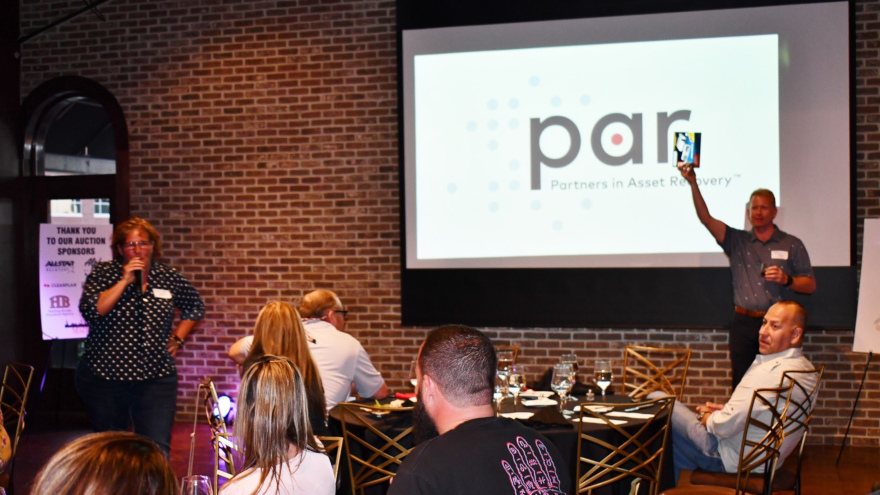A member of the SubPrime 175 is enhancing its resources to maintain compliance with state and federal guidelines to better serve its auto-finance clients.
Victory Recovery Services, a provider of skip-tracing and national repossession management for creditors with collateral secured contracts, is taking another step in enhancing its risk assessment and due diligence efforts by partnering with VendorInsight.
“We have worked hard at VRS to provide national coverage and seamless recovery effort for our vendor network,” Victory Recovery Services founder and chief executive officer Mark Davis said. “We believe our due diligence is protected by the award-winning risk management platform, VendorInsight, to provide VRS a support system that will monitor, alert, and provide necessary metrics as it relates to our vendor network.
The partnership with VendorInsight will provide VRS a platform to ease the manpower burden required during and after the on-going vendor process, as well as give us a viable vendor research tool for evaluation and due diligence activities,” Davis continued.
“This move will confirm our commitment and confidence in our ability to deliver on our ‘No Risk, Just Results’ mission,” Davis went on to say. “Now with the secure and automated services of VendorInsight at our disposal, we couldn’t be more excited to reaffirm our promise to our clients and demonstrate VRS has a high-quality vendor relations team.”
For more details about the company, go to www.vrs-corp.com.
Security National Automotive Acceptance Co. (SNAAC), a non-prime auto finance company, and Primeritus Financial Services, a provider of recovery management, skip-tracing, and remarketing services to the auto finance industry, announced their collaborative partnership on Tuesday.
Primeritus will provide SNAAC its full suite of remarketing services for SNAAC’s automotive portfolio.
“Primeritus has a solid reputation in the industry by helping auto finance companies improve their remarketing strategies and obtaining the highest returns in the auction lanes,” said Chris Mitcham, senior vice president of collections with SNAAC.
“SNAAC is proud to partner with a company that will help us; improve our portfolio results, lower our overall days to sell, manage cost, experience premium lane placement and participate in their vehicle certification process in order to obtain the highest vehicle retention value,” continued Mitcham, who was highlighted in this year’s Remarketing & Used-Car Industry’s 40 Under 40 produced by Auto Remarketing.
Primeritus vice president of remarketing Keith Byrd added, “The team at Primeritus is very excited and proud to partner with an established company like SNAAC. Primeritus has decades of combined experience in the remarketing industry which will also assist SNAAC in achieving their remarketing goals. We look forward to working together and providing an excellent remarketing experience.”
Joe Mappes, executive vice president of Primeritus Financial Services, also commented about this week’s development.
“SNAAC and Primeritus share a common objective; to deliver best-in-class service and results for our clients,” Mappes said. “By utilizing Primeritus’ proprietary remarketing technology, SNAAC will have data and insights relating to key performance indicators in the remarketing cycle which will help drive educated remarketing decisions.
“We are humbled SNAAC has named Primeritus as their trusted business partner in this facet of their collections cycle,” Mappes went on to say.
The Consumer Financial Protection Bureau concentrated the auto-finance portion of its latest supervisory highlights on two of the most complicated matters when someone needs credit to acquire a vehicle — repossession and the application of insurance proceeds.
Before deploying a repossession agent to find and take back a vehicle, the CFPB acknowledged that many finance companies provide options to consumers in an effort to avoid repossession when a contract is delinquent or in default. The bureau also recognized in the summertime update that finance companies may offer formal extension agreements that allow consumer to forbear payments for a certain period of time or may cancel a repossession order once a consumer makes a payment.
But then, problems came to light, at least according to the CFPB’s investigations.
“One or more recent examinations found that servicers repossessed vehicles after the repossession was supposed to be cancelled. In these instances, the servicers incorrectly coded the account as remaining delinquent, or customer service representatives did not timely cancel the repossession order after the consumer’s agreement with the servicers to avoid repossession. The examinations identified this as an unfair practice,” bureau officials said in the supervisory highlights.
"The practice of wrongfully repossessing vehicles causes substantial injury, because it deprives borrowers of the use of their vehicles and potentially leads to additional associated harm, such as lost wages and adverse credit reporting,” officials continued.
“Such injury is not reasonably avoidable when consumers take action they believed would halt the repossession, and there is no additional action the borrower can take to prevent it,” the CFPB went on to say.
The bureau made one more point about the ramifications of errors happening during the repossession process, stating a financial injury is not outweighed by countervailing benefits to the consumer or to competition.
“No benefits to competition are apparent from erroneous repossessions. And the expense to better monitor repossession activity is unlikely to be substantial enough to affect institutional operations or pricing,” the CFPB said.
In response to the examination findings, the bureau indicated finance companies are stopping the practice, reviewing the accounts of consumers affected by a wrongful repossession and removing or remediating all repossession-related fees.
Insurance issues
Before delving into the repossession world, the CFPB recapped what’s happened when it’s investigated finance companies in connection with insurance.
The bureau shared in the supervisory highlights that one or more examinations observed instances in which notes required that insurance proceeds from a total-vehicle loss be applied as a one-time payment to the contract with any remaining balance to be collected according to the consumer’s regular billing schedule.
However, in some instances after consumers experienced a total-vehicle loss, the CFPB said finance companies sent billing statements showing that the insurance proceeds had been applied to the loan payments so that the loan was paid ahead and that the next payment on the remaining balance was due many months or years in the future.
“Servicers then treated consumers who failed to pay by the next month as late, and in some cases also reported the negative information to consumer reporting agencies,” bureau officials said.
“The examination found that servicers engaged in a deceptive practice by sending billing statements indicating that consumers did not need to make a payment until a future date when in fact the consumer needed to make a monthly payment,” they continued. The billing statements contained due dates inconsistent with the note and the servicer’s insurance payment application.
Such information would mislead reasonable consumers to think they did not need to make the next monthly payment. The misrepresentation is material because it likely affected consumers’ conduct with regard to auto loans,” the bureau went on to say.
Had the information been presented differently?
“Consumers would have been more likely to make a monthly payment if they knew that not doing so would result in a late fee, delinquency notice or adverse credit reporting,” the bureau said in its latest compliance update.
In response to examination findings, the CFPB state that finance companies are sending billing statements that accurately reflect the account status of the contract after applying insurance proceeds from a total-vehicle loss.
It might only be August, but the American Recovery Association (ARA) already has April on its radar.
ARA in conjunction with headline sponsor, Harding Brooks Insurance, announced the theme, secured keynote speakers and early bird registration details for the 11th annual North American Repossessors Summit, which is set to take place at the Omni Mandalay Hotel in Irving, Texas, on April 18-19.
Seeking to address the ever-changing business environment and to help attendees conquer the fear of change, the NARS 2019 theme has been coined: “Adapt, Conquer and Overcome: Accept the Marketplace, Face your Fears and Make Money.” The NARS planning committee swiftly and unanimously chose this theme for NARS 2019, thanks to their combined experiences from the lending, recovery agent and vendor sides of the industry.
“With the way the industry is structured today, it’s truly an ‘adapt-or-die’ situation for small business owners,” ARA president Dave Kennedy said. “The speakers and education sessions at this year’s NARS will be heavily business-focused. We want to arm recovery professionals with the tools they need to change their strategy, embrace new practices and build a business they can eventually retire from or pass on to the next generation.”
Breaking records of past summit timelines, the committee has already secured two keynote speakers: Bob Burg, motivational speaker and bestselling business author; and Mike Sarraille, a former Navy SEAL officer.
A highly acclaimed speaker and the author of "The Go-Giver", a Wall Street Journal and BusinessWeek Bestseller, Burg will deliver a three-hour business workshop at NARS 2019. Through this workshop, Burg will teach NARS attendees profitable, business-building skills they can immediately take back to their businesses. He was named one of the 30 Most Influential Leaders by the American Management Association and one of the Top 200 Most Influential Authors in the World by Richtopia.
In addition to serving 15 years as a Navy SEAL officer and five years as a U.S. Marine and Scout-Sniper, Sarraille is a graduate of the University of Texas McCombs Business School. Not only is he a leadership instructor and strategic adviser for Echelon Front, a management and consulting firm, but he’s also a recipient of the Silver Star, six Bronze Stars, two Defense Meritorious Service Medals and a Purple Heart.
According to Echelon Front, Sarraille and his fellow SEAL members in the program “creatively interweave edge-of-your-seat SEAL and Top Gun combat stories with practical leadership concepts and principles.”
Early bird registration is now open for $375, a savings of nearly 25 percent off the normal registration fee. Individuals can sign up for early bird registration at reposummit.com.
ARA members also can purchase tickets for up to four additional staff members at a rate of $250 per person. Registration for exhibiting and sponsorship opportunities for NARS 2019 will be announced and open to the public soon.
PAR North America recently held an event to honor 15 of the best repossession operations in the country and generated funds to help agents who sustain negative consequences that sometimes come with the job.
The business unit of KAR Auction Services handed out accolades for Agent of the Year, Resolution and Compliance Champion and various regional awards. The awards ceremony included an auction benefiting the Recovery Agents Fund (RABF).
PAR North America — a leading U.S. provider of vehicle transition services with coast-to-coast solutions for recovery management, skip tracing, remarketing and title services — honored Final Notice Recovery of Maryland as Agent of the Year for its high vehicle recovery rates and consistent dedication to providing excellent customer service.
Zane Investigations of Nevada was honored as the 2018 Resolution and Compliance Champion for its commitment to resolving customer issues promptly resulting in fewer customer complaints while meeting all compliance requirements and reporting on a weekly basis.
PAR North America and its recovery agent partners raised $40,000 for the fund. RABF provides financial help to families impacted by the dangers of the repossession industry and the unfortunate circumstances that may prevent those in the industry from being able to plan for unexpected events that can arise and devastate a family.
Other honorees included:
Regional Choice Awards
— Coastline Recovery Services of California
— Alpha Recovery of Arizona
— West Texas Auto Recovery of Texas
— Seize of Illinois
— Specialized Towing of Florida
— Associates Asset Recovery of North Carolina
— International Recovery Systems of Pennsylvania
Impound Agent of the Year
— H & S Recovery of Georgia
Resolution Champion
— Allstar Recovery of Mississippi
LPR Agent of the Year
— Hide and Seek Recovery of Texas
Rookie of the Year
— Skagit Towing and Recovery of Washington
Sidekick Salute
— AGR Recovery Specialists of Florida
— Relentless Recovery of Ohio
Over the past year, the handling of personal property and redemption fees has become one of the hottest compliance topics in the industry. It is on the radar screen of virtually every auto finance company in the country, as well as the regulators. Most of this interest is sparked by Consumer Financial Protection Bureau concerns over disparate treatment of customers and inconsistencies in what customers are charged.
This issue has resulted in significant changes by most lenders as to how these fees are handled. Most lenders have shifted their approach to one of the emerging five models:
• Fees charged are up to agent and collected by agent
• Fees charged are up to agent and billed to lender
• Lender sets allowable charges and are collected by agent
• Lender sets allowable charges and are billed to lender
• All in one pricing
The remainder of this article will examine the key issues surrounding each model and aim to give you additional data points to gain a better understanding of the individual approaches. Let’s look at the five models in a little more detail:
Fees Set by Agent/Collected by Agent
Most major lenders have moved away from this approach primarily because lenders have little control or visibility on what is actually being charged. Consumers face the same dilemma and can be taken advantage of by agents. It’s no surprise that the lending community is migrating away from this model.
Fees Set by Agent/Billed to Lender
Although some states do regulate and specify repossession related fees, this approach still leaves the lender exposed to wide variations in fees charged. This structure does provide more visibility but there are inconsistencies on what is charged to different customers and by different agents.
Lender Sets Allowable Charges/Collected by Agent
When it comes to personal property and redemption fees, this is one of the better models as it reduces disparate treatment and ensures reasonableness. The lender sets allowable charges which establishes a guideline for the agent. While a more favorable approach, the lender continues to lack visibility since there’s no guarantee that an agent will comply.
Lender Sets Allowable Charges / Billed to Lender
When lenders set allowable charges and it’s also billed to the lender, there is both visibility and accountability. More and more lenders are migrating to this approach.
All in One Pricing
All in One pricing is a single flat fee set by the lender that covers the cost of the repossession, any personal property or redemption-related fees, and other ancillary services that might occur. This model is extremely straight forward and very easy for lenders to administer. It’s a one size fits all approach; however, therein lies the challenge. Only a percentage of repossessions involve personal property, redemption and storage. This makes it difficult to come up with an appropriate price that would make sense for every repossession.
Our Recommendation
Each model does offer some advantages and disadvantages. However, based on an assessment of interests of the various stakeholders as well as both the administrative and regulatory issues, ALS Resolvion has been recommending the following framework to our clients:
• Allowable fees established by the lender and billed to the lender
• Personal Property Fee: Maximum of $50 unless state law provides specific guidelines in which case state law would apply.
• Vehicle Redemption: Storage of $20 per day for the first five days of storage and$35 per day thereafter. Redemption/Administrative fees – Maximum of $75. Total Maximum redemption related fees (admin fees + storage) equals $150.
We feel that this framework strikes the right balance between a fee schedule that is reasonable for the agent, the need to be fair to the consumer and the need for a process that the lender can defend from a compliance standpoint.
Mike Levison is the chief executive officer of ALS Resolvion. More details about the company can be found at www.alsresolvion.com.
Another way for repossession agencies to find the personnel they need recently launched.
The American Recovery Association (ARA), in partnership with TalentValue, recently rolled out an improved ARA Job Board at repojobs.us. It’s part of the association’s ongoing member recruitment strategy with TalentValue.
Through the job board, ARA members can post current job openings. The association intends for this new job board to connect ARA to fresh talent within the repossession industry, while also providing an indispensable resource for job hunters within the community.
The site makes job application quick and easy for candidates, and it streamlines the reviewal process for employers.
“The launch of the ARA Job Board will form an important critical link to helping ARA members find great people,” said Doug Duncan, president of TalentValue. “As this job board grows, it will have greater and greater impact on the industry as a whole, because the health of ARA’s member companies will become stronger and more profitable.”
Job seekers can narrow their search criteria, including:
1. Job title
2. Company name
3. Keyword
4. City, state and ZIP code
Agency members can get started with the recruiting process by following these steps:
1. Register your own career web page.
2. Post your own positions.
3. Use OnePost search engine optimized job postings.
4. Use TalentValue's Applicant Tracking System to vet your candidates.
5. Use the JobFit Assessment to avoid hiring mistakes.
6. Further vet your candidates with ARA's Compliance Background Checking Services.
7. Reach out to a TalentValue Recruiting Expert to get started.
It all can be starting by going to repojobs.us.
For more information about ARA, its partnerships, and its member benefits, visit repo.org.
The next step in the collaboration involving the American Recovery Association and the National Automotive Finance Association unfolded on Wednesday.
Continuing their repossession efficiency project, ARA unveiled its newly improved Certified Collateral Recovery Specialist (CCRS) program.
The resulting baseline standards agreed upon by ARA and NAF Association encompass the key areas of vendor compliance, including owner/business regulatory reviews, training, policies and procedures and vendor site visits.
“The newly renovated CCRS program makes the compliance and education platforms much more efficient, which is something we’ve worked to achieve for a long time,” ARA president Dave Kennedy said. “In addition to reducing costs, I believe our CCRS program is the most well-constructed program in the industry.”
Kennedy insisted that ARA’s CCRS certification is the most comprehensive compliance exam in the industry, and it’s only awarded to those who score in the 80th percentile and above on each exam.
“We’re proud that our program was written by education professionals with the advice of attorneys, not by attorneys for attorneys,” said Les McCook, executive director of ARA.
Used nationwide by finance companies to the benefit of their organization and vendor network, ARA pointed out that its CCRS is least expensive program of its kind in the industry, and it’s the only all-inclusive system available to date.
In addition to rivaling any other training platform, association leadership highlighted the added benefits of ARA’s system include client customization, fingertip information resources and outside independent audits.
“For those paying these costs for their entire network, this is a major savings when compared to comprehensive operational costs,” ARA said.
ARA’s CCRS program is currently accepted by several finance companies in the country. Not only is it recognized by the Louisiana state government, but ARA indicated it will soon be also recognized in several states.
“ARA is working diligently toward full national adoption,” the association said.
For more information about ARA, its partnerships and its member benefits, visit repo.org.
Over the years, repossession and skip-tracing services have come to be viewed somewhat as commodities by many in the lending community. As such, outside of compliance, the primary focus around the management of these services has been cost. After all, since these services are available through multiple providers, why pay more than what the low-cost provider is willing to accept?
This downward pressure on costs has resulted in the service providers having to reduce resource allocation, in several key areas, in order to maintain an acceptable margin on the business. In many cases, this strategy ends up costing the lender more in the form of higher charge offs, higher priced deep skip services, etc.
However, some lenders have realized that even small differences in recovery rates can translate into big gains in net dollars recovered even if the cost of the repossession was slightly higher.
When recovery fees are driven down to rock bottom levels, the service provider (whether a direct agent or a forwarder/skip company) is typically forced to undertake one or more of the followings:
• Reduce the labor allocation devoted to the portfolio
• Reduce payment to the agent/driver
• Reduce the amount and quality of the data purchased from third party providers
Let’s look at each of these issues in a little more detail.
Labor allocation
In the case of forwarders or skip service providers, typically administrators or skip tracers are assigned to work a specific group of cases. The labor pool allocated to these functions is a significant part of the provider’s overall cost structure. When a lender pushes for rock bottom fees, inevitably queue sizes get increased in order to reduce labor cost. The more cases an investigator has to work, the less time that can be spent on each and recovery rates usually suffer.
Repossession agent fees
When margins are very tight due to low fees, the forwarder/skip provider is also limited as to how much can be offered to the recovery agency. In our case, those fees range from $275 on the low end to $375 on the high end. You can bet there is a big difference in the amount of effort the agent puts into the $375 cases than the $275 cases.
The repo agency faces the same dilemma since they also work primarily on a contingent model. On low fee cases, they will inevitably have to reduce the number of times an address is run, reduce the fee to the driver — or both.
This is a real issue in today’s world where the agent ranks have thinned over the past few years due to rising costs and compliance requirements. Fewer agents, combined with rising delinquency rates, means that agents are in a good position to pick and choose where they put their resources and you can be sure that they do just that. Wouldn’t you?
Reduced data purchases
When it comes to locating missing cars (outside of LPR technology) it is all about finding good addresses and contact numbers. Fortunately, there are many data sources out there that provide information. The cost can be anywhere from free to several dollars per report. As you might expect, the more expensive reports often (not always) contain the better/more current information. However, the service provider must be very careful on how and when the best data sources are used.
For instance, a $6 report on a portfolio that generates a 20 percent recovery rate will add $30 in cost per recovery just for that report. Combine that with a low fee schedule and it makes it very difficult to utilize that data source.
All of these “adjustments” that are required to deal with low margin business absolutely make a difference in recovery rates, charge offs, auction values, etc..
Financial impact
Let’s take a look at a couple of different analysis of the trade-off between higher recovery costs and higher recovery rates.
The analysis below illustrates the additional “lift” in recovery rates that is required to offset a $50 difference in recovery costs.
As you can see, based on these assumptions, the service provider would only have to generate less than one additional recovery for every 100 assignments to offset the cost of paying $50 more on all recoveries. This does not even take into consideration the value of avoiding the charge off.
Note: The below analysis is designed to illustrate two issues:
1. The extremely small (1/4 of 1 percent) additional recovery rate that would have to be achieved to offset an additional $50 recovery fee
2. The additional value ALSR believes it will generate based on the higher recovery rate we believe we can achieve
| |
$375 Recovery Fee |
$425 Recovery Fee |
$425 w/ Improvement |
| Involuntary Repo Fee |
$375 |
$425 |
$425 |
| Unit Value |
$10,000 |
$10,000 |
$10,000 |
| Annual Assignments |
1200 |
1200 |
1200 |
| Precentage Recovered |
45% |
45.25% |
48% |
| Number Recovered |
540 |
543 |
576 |
| Total Recovery Expense |
$202,500 |
$230,775 |
$244,800 |
| |
|
|
|
| Total Value of Recovered Units |
$5,400,000 |
$5,430,000 |
$5,760,000 |
| Less Recovery Expense |
-$202,500 |
-$230,775 |
-$244,800 |
| Net Recovery Value |
$5,197,500 |
$5,199,225 |
$5,515,200 |
| Additional Recovery Value |
|
$1,725 |
$317,700 |
Of course, the net benefit between higher costs and higher recovery rates is significantly impacted by auction values. Some portfolios deal in collateral that often has little more than scrap value when recovered and some have average values in excess of $25,000. The table below illustrates the financial gain, under different auction value scenarios, if recovery rate increases just 5 percent.
Here are three assumptions:
• 250 first placement cases per month
• 35 percent versus 45 percent recovery rate
• $50 increase in recovery fee
Average Auction Value
| |
$5,000 |
$7,500 |
$10,000 |
$15,000 |
| Additional Annual Recovery Value |
$690K |
$1.065MM |
$1.5MM |
$2.2MM |
If you would like to see a more detailed analysis based on the specifics of your portfolio, just let us know and we will prepare.
Summary
Cost is an important variable in the repossession management process, but pushing costs too low can produce a diminishing return.
Mike Levison is the chief executive officer of ALS Resolvion. More details about the company can be found at www.alsresolvion.com.
Primeritus Financial Services is looking to be the forwarding company of choice for finance companies that have more than just cars and trucks in their portfolio.
Primeritus recently announced the acquisition of Capital Recovery Group (CRG). Based in Tucson, Ariz., CRG is a recovery solution company dedicated solely to the powersports community.
CRG, founded by Nic Spallas, Adam Jones and Dennis Louderback, is the seventh acquisition by Primeritus since 2012. The company’s most recent move came a little more than a year ago when Primertis purchased Global Investigative Services, then a Rockwell, Texas-based provider of vehicle skip-tracing services, equipment recovery and investigative services for the finance industry.
“We are very selective when considering potential acquisition targets, evaluating many different aspects of the company,” Primeritus president and chief executive officer Scott Peters said.
“We were very impressed when we talked to the team at CRG and knew right away that this would be a great addition to the Primeritus family of companies,” continued Peters, who is among the cast of experts and executives already on tap to be a part of Used Car Week, which begins on Nov. 12 in Scottsdale, Ariz.
Primeritus Financial Services said that with the acquisition, CRG will undergo a name change. The new company will be known as Find Track Locate.
“CRG has an excellent reputation within the powersports industry. We look forward to working with their team to enhance their service offerings and continue to drive innovation, compliance and efficiency for CRG’s and Primeritus’ clients,” Primeritus senior vice president of operations Chris McGinness said.
“While Primeritus has a presence in the powersports market, this acquisition allows us to grow our footprint significantly in this arena.” McGinness continued
Louderback, who is CRG VP and general manager, added, “We are delighted to join Primeritus which is the leader in the recovery, skip tracing and remarketing services industries.”
“And we look forward to moving our company toward a new level of quality and service,” Louderback went on to say.












